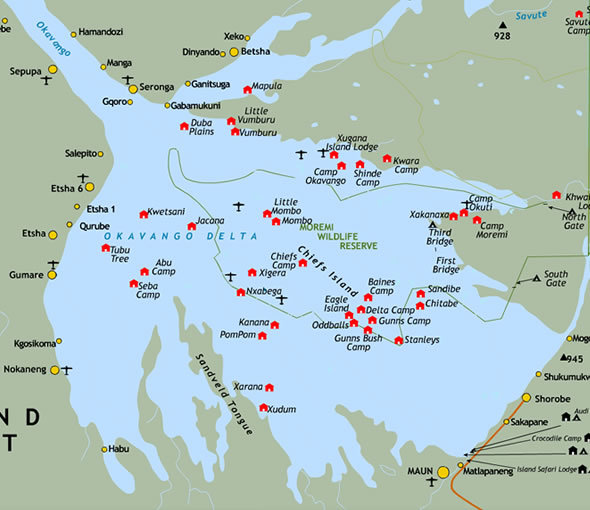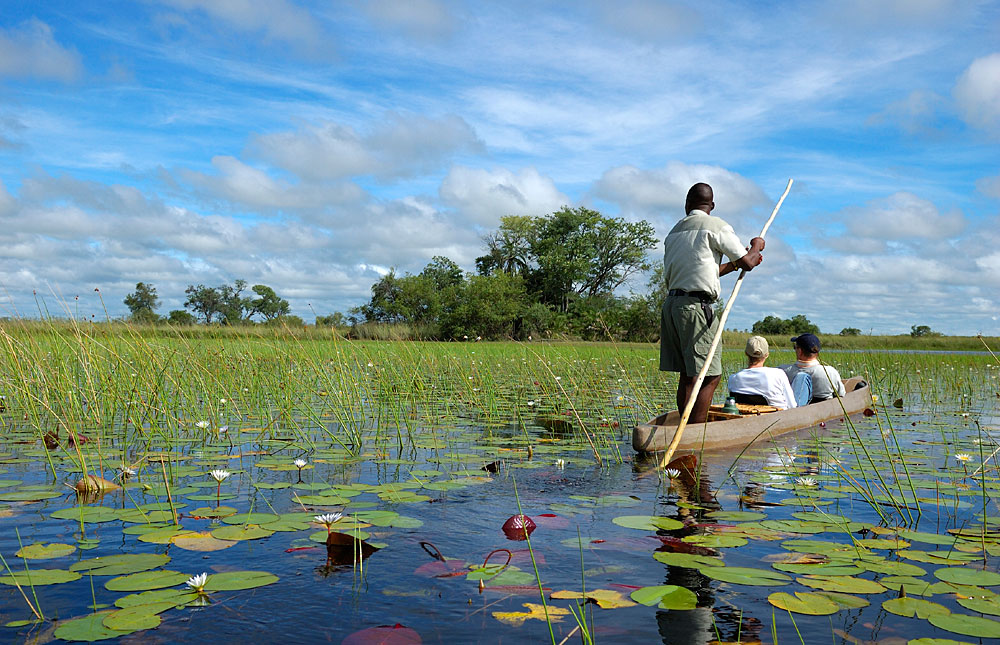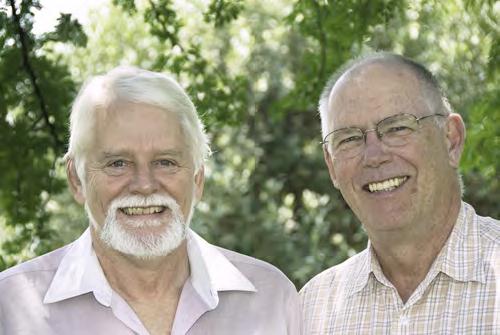An exotic setting for this krimi in the heart of Africa. It opens in a tourist camp at the Okavango Delta, at the confluence of the Chobe and Linyanti Rivers where Namibia, Zambia, Zimbabwe, and Botswana meet with Angola not far away.
 The red dots are tourist camps on higher and drier ground.
The red dots are tourist camps on higher and drier ground.
The nearest town, for those consulting a map, is Kasane near Victoria Falls. The waters are replete with crocodiles, water snakes, and hippopotami.
 ‘Don’t fed the crocs. Keep your hands and feet in the boat!’
‘Don’t fed the crocs. Keep your hands and feet in the boat!’
There are many descriptions of sunsets and sunrises in workman-like prose. Our hero is Detective David Bengu, known as Kubu because of his resemblance of his manly figure to a hippopotamus.
It is a small tourist camp; one that is decidedly downmarket: Basic, no luxuries to attract high-paying guests. It represents the inheritance of the owner, and it is run by Dupie who has spent his life in the bush. The area is a swamp more than anything else and boats are essential and even more essential is someone who knows how to handle them in the rivers, the current with those crocodiles and hippos have to be avoided.
The dozen or so guests are a combination of Europeans and Africans, white and black, local and foreign. That is the norm in these camps, we are given to understand.
The abnormal is that one of the guests, an African black name Goodluck Tinubu, according to his driver’s license, is found dead in his tent one morning. He was very clearly murdered, his throat cut. The local plod from Kasane arrives and deploys the usual conventions of the police procedural.
No sooner do the police investigate the camp staff and the remaining guests than another of them is found dead, with his head smashed by our old friend, blunt instrument. Two murderers in quick succession within a few meters of each other is too much for the local plod and a call goes to distant Gaborone for help. The Number One Detective Agency is not available so our protagonist takes the case.
It gets worse when fingerprint identification shows that the the titular first victim died thirty years earlier during the Rhodesian War! This is his second death.
The conventions then go into overdrive. We learn Kubu’s backstory, his likes and dislikes, his capacity for beer, his vexed relationship with his boss, his family life… His constant preoccupation with food and drink to the exclusion of much else. In a word, boring. The only part of this backstory that I found amusing was the report of the schoolboy experiences with the game of cricket, and even that was a distracting digression.
Much more interesting are the legalities, political niceties, and social morēs of that part of the world. Though it is far away, South Africa looms large. While the Rhodesians War ended thirty years before, its baleful influence remains palpable. Many of the people we meet in the story were displaced first by the war or then later by the malignant regime that now rules, one set of chains having replaced another. Underlying all that recent history, the ancient tribal differences remain the bedrock of relations among the locals.
The camp is not owned but rather is a concession, one about to expire. The owner of the concession is not at sure she wants to retain it, and even if she did, she is not sure she has the means to do so.
Each of the guests is limned, revealing that each has a story related to this part of the world. The wars for independence and civil wars there left scars, physical and psychic on both the participants and their progeny. And no krimi is complete today without a reference to the drug trade with vast amounts of money that entrails.
The detail of the camp, the tourist trade, the relationship among the actors are all very well done. There is also some insights into the plight of Zimbabwe that remain with the reader. I would prefer much more of that and much less of Kubu’s diet.
The authors are a pair, who seem to work together seamlessly. Well done!
 Michael Sears and Stanley Trollop
Michael Sears and Stanley Trollop
This is the second title in the series. In the way that publishers have of confusing the international market, this book has another title in the United States, ‘A Deadly Trade.’ A reference, no doubt, to alert readers to the drug trade. Strikes the sledge hammer of subtlety again.
I see there is a third and I will get to it one day. I find the exotic setting very interesting but Kubu himself is a bore. He is always far more interested in himself than anything else.
Skip to content
